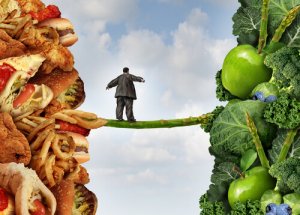Stress and Poor Nutrition


Reviewed and approved by the psychologist Sergio De Dios González
Stress is a problem in itself, however, stress can also sometimes lead to unhealthy life patterns. It becomes a vicious cycle in which you eat poorly because you are stressed out.
The number of people who experience stress coupled with nutritional deficiencies and poor eating habits keeps growing. When we’re under a lot of pressure and stress, we tend to choose foods with less nutritional value, like foods with a lot of refined sugar and saturated fat. These unhealthy food choices can create more stress in the long run, as well as other health problems.
One way to regulate stress is to pay attention to nutrition. Below, we’ve listed common unhealthy eating patterns related to stress. If you identify them and you’re able to control them, you’ll be able to regulate your stress level, or at least prevent it from rising.
1. Drinking too much coffee
Coffee is a strong stimulant that makes us feel full of energy and helps to combat fatigue and drowsiness. But coffee has profound effects on the body and is a potentially addictive beverage.
Although coffee can have benefits in moderation, it’s been demonstrated that the abuse of caffeine increases stress. Caffeine is also found in tea, some sodas, energy drinks, and chocolate.
Caffeine increases levels of cortisol – the stress hormone – which can produce headaches, heart palpitations, and nervousness.

2. Eating foods that increase cortisol levels
Coffee is not the only thing that increases cortisol levels. Refined sugars and simple carbohydrates do too. Foods rich in saturated and trans fats can also cause high cortisol levels. These fats are found in many snacks and fried foods.
In large quantities, animal products like red meats, cheese, and full-fat dairy products can cause imbalances in cortisol levels. To keep cortisol levels under control, it’s better to choose complex carbohydrates rich in fiber and foods rich in monounsaturated and polyunsaturated fats.
3. Skipping meals
Many people skip meals when they are under stress. However, eating is fundamental to controlling stress. Through food, you receive the nutrients and energy necessary to function properly. Although as we’ve seen, you can’t eat just anything.
For many people, their excuse for not eating is that they have too much to do. However, the mere act of stopping to eat relaxes the body and mind, alleviating some of the accumulated tension.
One way to eat healthy without complicating life is to drink green, energizing smoothies. They’re easy and quick to prepare, and they provide energy and nutrients that are easily absorbed.

4. Not drinking water
Drinking water is essential for the proper functioning of the body and brain. But more than just fulfilling a vital function, water has an important power against stress. When we stop to drink water, the brain receives a message of tranquility.
If you have the time to stop and drink, it means there is no danger sneaking up on you, and your mind will relax because of that.
5. Eating compulsively
Eating compulsively and emotionally is another reaction to stress, especially if you’ve gone a long time without eating or drinking water.
When people eat emotionally, they tend to choose unhealthy foods that are high in fat and calories. To avoid this, always have healthy options at hand to calm your hunger, especially fresh fruit and water.
Poor nutrition does not only affect stress levels. It also leads to low immunity and can cause serious health problems. If you eat well, you’ll reduce stress and have better physical and mental health.
This text is provided for informational purposes only and does not replace consultation with a professional. If in doubt, consult your specialist.








